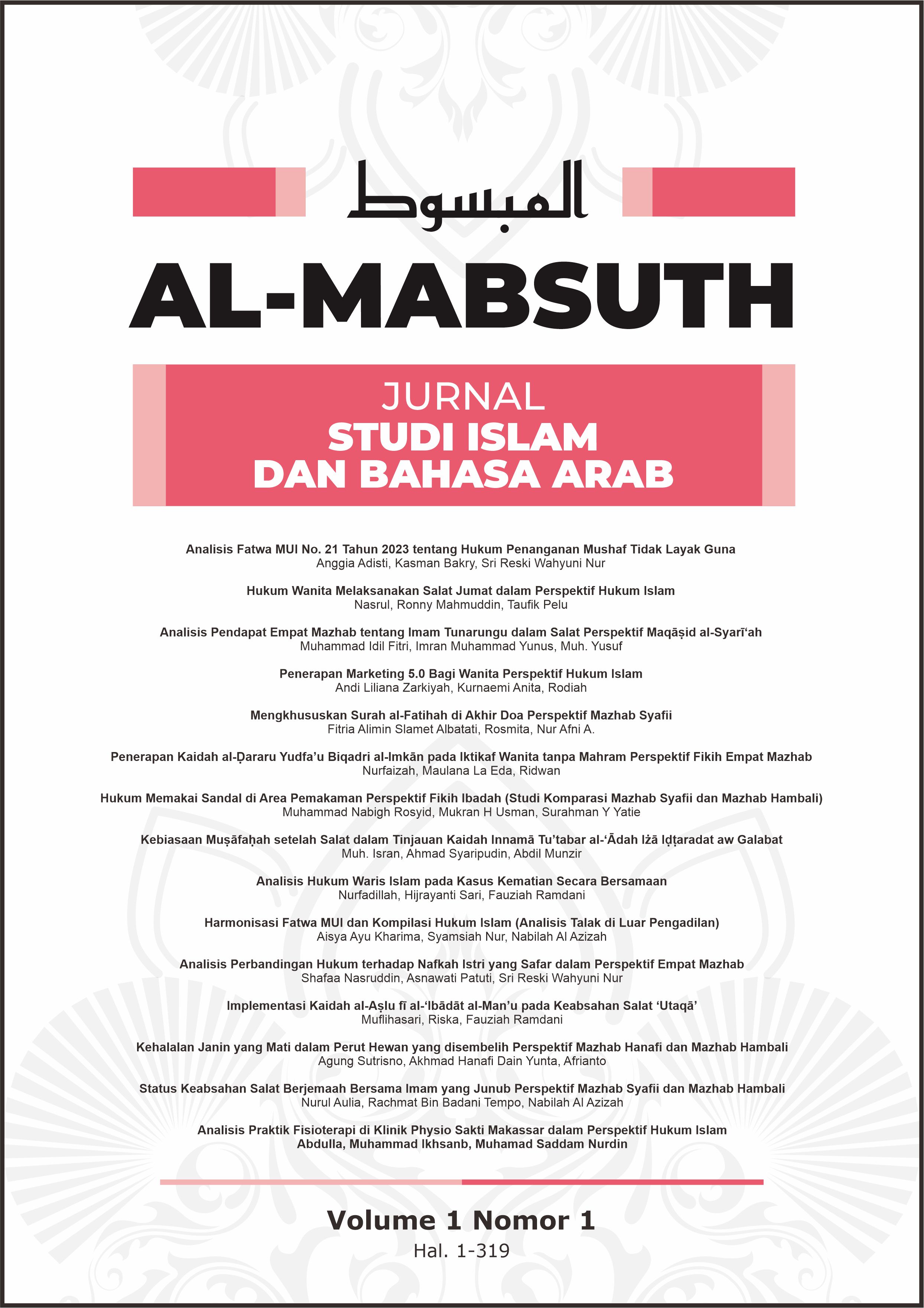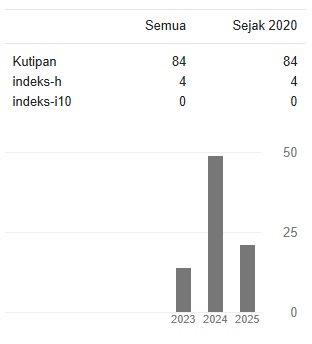Analisis Pendapat Empat Mazhab tentang Imam Tunarungu dalam Salat Perspektif Maqāṣid al-Syarī’ah
Analysis of the Opinions of Four Madhhabs on Deaf Imams in Prayer from the Perspective of Maqāṣid al-Syarī’ah
DOI:
https://doi.org/10.36701/mabsuth.v1i1.2408Keywords:
Four schools of thought, Imam, Maqāṣid al-Syarī’ah, Salat, DeafAbstract
The imam plays an important role in leading the recitation and movements of congregational prayer in accordance with Islamic law. However, controversy arose when the imam was replaced by a deaf person, due to differences in opinion between schools of thought. This study aims to examine the opinions of four schools of thought regarding the ruling on a deaf imam in prayer and its relevance to the theory of maqāṣid al-syarī’ah, particularly the principle of ḥifẓ al-dīn (preserving religion). This study employs a descriptive qualitative method through literature review. The results of the study show: First, the concept of maqāṣid al-syarī’ah is a concept of public interest contained in every Sharia law. With this approach, Islamic law becomes more relevant and able to respond to contemporary challenges. Second, the Hanafi school of thought does not explicitly discuss the law of a deaf imam. The Māliki school of thought has two opinions: some permit it on the condition that the imam is ahlul Qur’an, while others consider it makruh if he is appointed as a permanent imam. The Shāfi’i school of thought permits it absolutely. The Ḥanbali school of thought has differing opinions: some permit it absolutely, while others consider it haram. Third, the view of the Maliki school of thought, which requires the imam to be ahlul Qur'an and discourages him from becoming a permanent imam, is in line with the principles of ḥifẓ al-dīn and ḥifẓ al-'irḍ in maqāṣid al-syarī'ah because it considers the interests of the ummah in maintaining the existence of worship. This finding enriches the body of Islamic legal scholarship through the lens of maqāṣid al-syarī‘ah.
Downloads
References
Al-Qur’ān al-Karīm
Buku:
Anggito, Albi dan Johan Setiawan. Metodologi Penelitian Kualitatif. Sukabumi: Jejak Publisher, 2018.
al-Albāni, Abū ‘Abdirrahmān Muḥammad Nāṣir al-Dīn. Ṣaḥīḥ Sunan Abī Dāwūd. Juz 3. Cet. I; Kuwait: Mu’assasah Girās li al-Nasyr wa al-Tawzī’, 1423 H/2002 M.
al-Bukhāri, Abū ‘Abdillāh Muḥammad ibn Ismā’il. Ṣaḥīḥ al-Bukhāri. Juz 1. Cet. V; Damaskus: Dār Ibn Kaṡīr, 1414 H/1993 M.
al-Fāsi, ‘Alāl. Maqāṣid al-Syarī’ah al-Islāmiyyah wa Makārimuhā. Cet. V; Beirut: Dār al-Garb al-Islāmi, 1413 H/1993 M.
al-Ḥajjāwi, Abū al-Najā Syaraf al-Dīn Mūsa al-Maqdisi. Al-Iqnā’ Fī al-Fiqh al-Imām Aḥmad. Juz 1. Beirut: Dār al-Ma’rifah, 1431 H/2010 M.
al-Ḥatṭāb, Syams al-Dīn Abū ‘Abdillāh Muḥammad ibn Muḥmmad al-Magribi. Mawāhib al-Jalīl fi Syarh al- Mukhtaṣar al-Khalīl. Juz 2. Cet. III; Beirut: Dār al-Fikr, 1412 H/1992 M.
Ibn ‘Asyūr, Muḥammad Ṫahir ibn Muḥammad al-Tūnisi. Maqāṣid al-Syarī’ah al-Islāmiyyah. Juz 3. Cet. III; Qatar: Kementerian Perwakafan dan Urusan Islam, 1425 H/2004 M.
Ibn al-‘Arabi, Muḥammad ibn ‘Abdillāh Abū Bakr. Al-Masālik Fī Syarh Muwaṭṭa’ Mālik. Juz 3. Cet. I; Beirut: Dār al-Garb al-Islāmi, 1428 H/2007 M.
Ibn Kaṡīr, Abū al-Fidā Ismā’il ibn Umar al-Qurasyi al-Dimasyqi. Tafsir al-Qur’an al-‘Aẓīm. Juz 1. Cet. II; Dār Ṭaybah Li Al-Nasyr wa Al-Tawzī’, 1420 H/1999 M.
Ibn Makhdūm, Muṣṭafa. Qawā’id al-Wasāil Fī al-Syarī’ah al-Islāmiyyah. Cet. I; Riyadh: Dār Asybīlīyā li al-Nasyr wa al-Tawzī’, 1420 H/1999 M.
Ibn Manẓūr, Muḥammad ibn Makram ibn Ali Abū al-Faḍl Jamāluddīn al-Anṣāri. Lisān al-‘Arab. Cet. III; Beirut: Dār Ṣadir, 1414 H/1994 M.
Ibn Qayyim, Abū ‘Abdillāh Muḥammad ibn Abī Bakr ibn Ayyūb. I’lām al-Muwaqqi’īn ‘an Rabb al-‘Ᾱlamīn. Juz 1. Cet. I; Riyadh: Dār Ibn al-Jawzi, 1423 H/2003 M.
Ibn Qudāmah, Muwaffaq al-Dīn Abū Muḥammad ‘Abdullah ibn Muḥammad al-Maqdisi. Al- Mugni. Juz 3. Cet. III; Riyadh: Dār ‘Ālim al-Kutub li al-Ṭibā’ah wa al-Nasyr wa al-Tawzī’, 1417 H/1997 M.
Ibn Rusyd, Abū al-Walīd Muḥammad ibn Aḥmad al-Qurṭubi. Bidāyah al-Mujtahid wa Nihāyah al- Muqtaṣid. Juz 1. Cet. I; Kairo: Dār al-Ḥadīṡ, 1425 H/2004 M.
Ibn Taimiyyah, Taqiy al-Dīn Abū al-‘Abbās Aḥmad ibn Abdul Ḥalīm. Minhāj al-Sunnah al-Nabawiyyah. Juz 4. Cet. I; Riyadh: Jāmi’ah al-Imām Muḥammad Ibn Su’ūd, 1406 H/1986 M.
al-Jawhari, Abū Naṣr Ismāil ibn Ḥammād al-Fārābī. al-Ṣiḥāḥ Tāj al-Lugah. Juz 5. Cet. IV; Beirut: Dār al-‘Ilmi, 1407 H/1987 M.
al-Juzairiy, Abdurrahman ibn Muḥammad ‘Auḍ. al-Fiqh ‘ala al-Mazahib al-Arba’ah. Juz 1. Cet. II; Beirut: Dār al-Kutub al-‘Ālamiyyah, 1424 H/2003 M.
Kementerian Agama RI. Al-Qur’an dan Terjemahnya. Jawa Barat: PT. Sygma Examedia Arkanleema, 2003.
Kementerian Perwakafan dan Urusan Islam Kuwait. al-Mawsū’ah al-Fiqhiyyah al-Kuwaitiyyah. Kuwait: Kementerian Perwakafan dan Urusan Islam Kuwait, 2006.
al-Khatṭābi, Abū Sulaimān Ḥamd ibn Muḥammad. Ma’ālim al-Sunan. Cet. I; Aleppo: al- Maṭba’ah al-‘Ᾱlamiyyah, 1351 H/1932 M.
Majma’ah al-Lugah al-‘Arabiyyah. al-Mu’jam al-Wasīth. Kairo: Majma’ah al-Lugah al-‘Arabiyyah, 1972.
al-Māwardi, Abū al-Hasan ‘Ali ibn Muḥammad ibn Muḥammad al-Baṣri. al-Aḥkām al-Sulṭāniyyah. Cet. I; Kuwait: Dār Ibn Qutaibah, 1409 H/1989 M.
al-Mibrad, Jamāl al-Dīn Abū al-Maḥāsin Yūsuf ibn Ḥasan ibn Abdul Hādi al-Ṣāliḥi. al-Dur al-Naqiy fi Syarh Alfāẓ al-Khiraqiy. Juz 2. Cet. I; Jeddah: Dār al-Mujtama’ li al-Nasyr wa al-Tawzī’, 1411 H/1991 M.
al-Naisabūri, Abū al-Husaīn Muslim ibn al-Hajjāj ibn Muslim al-Qusyairī. Ṣaḥīḥ Muslim. Juz 1. Kairo: Maṭba’ah ‘Īsa al-Bābiy al-Ḥalabi, 1374 H/1955 M.
al-Nasā’i, Aḥmad ibn Syu’aib ibn ‘Ali ibn Sinān Abū ‘Abdirrahmān. Sunan al-Nasā’i. Cet. II; Riyadh: Dār al-Haḍārah, 1436 H/2015 M.
Pusat Bahasa Departemen Pendidikan Nasional. Kamus Besar Bahasa Indonesia. Jakarta: Pusat Bahasa, 2008.
al-Raisūni, Aḥmad. Naẓariyyah al-Maqāṣid ‘Inda al-Imām al-Syāṭibi. Cet. II; Riyadh: al-Dār al- ‘Ᾱlamiyyah lil al-Kitāb al-Islāmi, 1412 H/1992 M.
al-Ramli, Syams al-Dīn Muḥammad ibn Abī al-‘Abbās Syihāb al-Dīn. Nihāyah al-Muhtāj ilā Syarh al-Minhāj. Juz 2. Beirut: Dār al-Fikr, 1404 H/1984 M.
al-Syāṭibi, Abū Isḥāq Ibrāhīm ibn Mūsa ibn Muḥammad, Al-Muwāfaqāt. Cet. I; Kairo: Dār Ibn ‘Affān, 1417 H/1997 M.
al-Yūbi, Muḥammad Sa’ad ibn Aḥmad. Maqāṣid al-Syarī’ah al-Islāmiyyah wa ‘Alāqatuhā bi al- Adillah al-Syar’iyyah. Cet. I; Riyadh: Dār Ibn al-Maḥbarah li al-Nasyr wa al-Tawzī’, 1418 H/1998 M.
al-Zuhailī, Muḥammad Musṭafa. Al-Wajīz fī Uṣūl al-Fiqh al-Islāmi. Juz 1. Cet. II; Damaskus: Dār al-Khair li al-Ṭibā’ah wa al-Nasyr wa al-Tawzī’, 1427 H/2006 M.
Jurnal Ilmiah:
Hasan, Muhammad Hanif, dkk.. “Keabsahan Imam Salat yang Belum Balig (Studi Komparatif Pendapat Mazhab Syafii dan Mazhab Hanafi)”, Al-Qiblah 2, no. 2 (2023): h. 199-216.
Nofiaturrahmah, Fifi. “Problematika Anak Tunarungu dan Cara Mengatasinya”, Quality 6, no. 1 (2018): h. 1-15.
Nur, Nurul Rahma, dkk.. “Pemboikotan Produk Pendukung Kejahatan Perspektif Maqāṣid al-Syarī’ah”, Al-Fikrah 1, no. 1 (2024): h. 284-303.
Safruddin, Ahmad Hafid dan Sholikhan. “Tinjauan Hukum Islam terhadap Praktik Akad Nikah Bagi Mempelai Tunarungu di KUA Kecamatan Badas Kabupaten Kediri”, El-Faqīh 6, no. 2 (2020): h. 114-133.
Syandri, dkk.. “Penulisan Kisah Fiksi Dalam Perspektif Maqāṣid al-Syarī’ah”, Bustānul Fuqahā 3, no. 2 (2022): h. 156-169.
Toriquddin, Moh. “Teori Maqāṣid al-Syarī’ah Perspektif Ibn ‘Asyūr”, Ulul Albāb 14, no. 2 (2013): h. 194-212.
Disertasi, Tesis, dan Skripsi:
Afrianto. “Fenomena Childfree di Indonesia dalam Perspektif Maqāṣid al-Syarī’ah”. Tesis. Makassar: PPs UIN Alauddin, 2023.
Setiawati, Putri Ayu Hanny. “Penerapan Writing Therapy pada Penyandang Tunarungu terhadap Peningkatan Harga Diri melalui Jourty Application”. Skripsi. Malang: Jurusan Keperawatan Poltekkes Kemenkes, 2020.
Downloads
Published
Issue
Section
License
Copyright (c) 2025 Muhammad Idil Fitri, Imran Muhammad Yunus, Muh. Yusuf

This work is licensed under a Creative Commons Attribution-NonCommercial-ShareAlike 4.0 International License.










